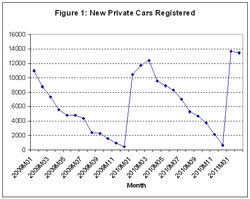Two positive externalities were identified as arising from the introduction of the scrappage scheme. Firstly, that it would save Irish jobs in the car dealership sector. This would prevent further job losses and additions to the dole. Secondly, it was also to provide a mechanism through which individuals would switch from older, more polluting cars to modern, more environmentally friendly cars. However, are these really worth the government getting involved to artificially support a market?
The reason why the car dealership industry was struggling was due to the current economic downturn and subsequent decline in disposable income available to the Irish population. This has general implications for a number of industries across the economy. However, Irish car dealerships have been singled out for specific, advantageous treatment. Why is this the case? Presumably it is because they have a powerful lobby group with which to put forward their arguments to policy makers. The intervention in the market is keeping dealerships open which would not have been able to survive without government support. However, what will happen when this support is removed? Will the dealerships still be able to survive? If not, then the support is providing nothing more than a short lived reprieve. The levels of consumption and spending experienced during the Celtic Tiger were unsustainable and will not be available to Ireland again in the future. Therefore, it could be argued that the intervention in the car dealership market provides little long run economic benefit.

 RSS Feed
RSS Feed
